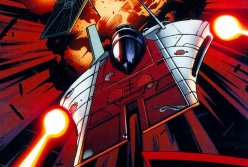RZ-1 A-Wing Interceptor
From TheHolo.Net Forums Wiki
(2) Concussion Missile Launchers
Sensor Jammer
The RZ-1 A-Wing Interceptor is the premiere interceptor of the Alliance Starfighter Corps. Originally developed by Alliance Underground Engineering, it was designed to be produced quickly and easily out of whatever materials were available at Rebel bases. The design was standardised for mass production by engineers from the Incom Corporation, and is now mass produced at the Mon Calamari Shipyards.
Design
Developed by senior Rebel Alliance officer Jan Dodonna and former Kuat Systems Engineering designer Walex Blissex, the A-Wing was intended to be a means to overcome certain performance discrepancies between Rebel and Imperial craft. Though the T-65B X-Wing Starfighter was a formidable craft, and its shields and hyperdrive gave it a decisive advantage over the Imperial TIE Fighter, the fighter lacked the speed and agility of the enemy craft. The Rebellion had lost the majority of its fighters during the Battle of Yavin, and arrogance had been the only thing preventing the Death Star from launching its full compliment of fighters. Dodonna wanted a Rebel fighter that was capable of out-flying a TIE Fighter, rather than just relying on its shields. Thus, the A-Wing was born.
Using the R-22 Spearhead starfighter - already nicknamed the "A-Wing" to conform with other Rebel -wing fighters - as a test-bed, Dodonna & Blissex concentrated mostly on improving the propulsion systems, increasing raw speed, acceleration, and manoeuvrability. Thrust for the new fighter was provided by a pair of J-77 Event Horizon engines. To allow the craft to perform well in atmospheric combat, guidance surfaces were incorporated into the design, and the aerodynamics of the hull were also improved.
The weapons systems also received a great deal of attention. Manoeuvrability was the TIE Fighter's key advantage, allowing the Imperial fighters to turn tighter than their Rebel contemporaries. A system was devised to allow the laser cannons mounted either side of the fuselage to be angled up to sixty degrees above or below the fighter's plane of flight: the fighter itself might not be able to turn as sharply as a TIE could, but it guns would be able to make up the difference. The fighter also carried an advanced electronic countermeasures package to jam Imperial sensors, helping to protect the A-Wing from missile locks and from detection during the initial stages of combat.
The prototype fighter proved to be extremely successful, and was quickly rolled out into service. Unfortunately, in the wake of the Battle of Yavin the Alliance lacked a central production facility at which they could construct the A-Wing fighters. Dodonna & Blissex devised a means whereby the fighter could be constructed from a variety of available components, allowing smaller facilities and even active Squadrons to construct new A-Wings in-house. Unfortunately, because each fighter was built on an individual basis rather from stock parts, the fighters tended to vary considerably from each other, which caused all manner of logistical problems.
Following the liberation of Mon Calamari, the Alliance gained access to the Mon Calamari Shipyards. An infrastructure to produce A-Wing fighters was established there, allowing for a "standard" A-Wing to be produced. However, with the Alliance still struggling to acquire the supplies and resources necessary, initial production was slow and by the Battle of Endor the Alliance lacked enough serviceable squadrons to mount a significant A-Wing presence during the assault on the second Death Star.
After the death of the Emperor production began to increase as parts became more easily accessible, and the increased use of the TIE Interceptor by the Imperial Navy made the A-Wing vital to the Alliance Starfighter Corps. Both SoroSuub and Incom were asked to develop an uprated version of the A-Wing to enter mass production; the Incom design was accepted as the preferred variant, but the more robust SoroSuub design also entered service as the RZ-2 A-Wing Interceptor.
Known Squadrons
Alliance of Free Planets
- Prowler Squadron
- Thunderbolt Squadron (currently flying RZ-2 A-Wings)
- Valkyrie Squadron (currently flying RZ-2 A-Wings)
- Viper Squadron


